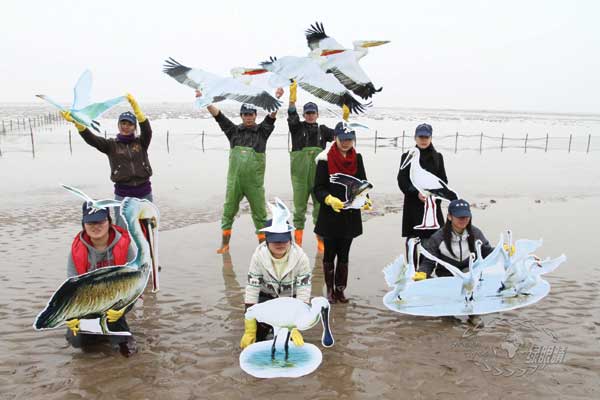Brave children
|
On the World Wetland Day on Feb. 2, 2010, volunteers of Greeneyes using performance art at the beach of Cangnan County to call on people to protect wetlands and birds. |
Fang's two-time abandonment of the examination helped others to recognize that he is a brave youth with lofty ideals. In fact, as early as the occasion when Fang won the Ford "Conservation and Environmental Grants,"Dr. Jane Goodall, UN messenger of peace, remarked that he was a "very brave young man."This brave youth has a sensitive and kind heart, but a heart that makes him stronger. When Greeneyes was first established, Fang was a child who blushed when facing journalists, uncomfortable with words and struggling to speak in public. In 2001, when Fang proposed the staging of publicity activities for "Bird-loving Week"to the Environmental Protection Bureau of Cangnan County, he had to call up all his reserves of courage, recalls Lin Chun, director of the Publicity and Education Department of Wenzhou Municipal Environmental Protection Bureau.
At first Greeneyes members rented a garage. Later, they stayed in the basement of a local reservoir and even in tents pitched in a farmyard. Even after they moved into a room less than ten meters square in Cangnan Children's Palace, working conditions were still very poor. But Fang and the Greeneyes volunteers never lost sight of their resolve to protect wild animals.
During the summer vacation of 2006, Yongjia County Forestry Bureau of Wenzhou City captured six wild animal poachers who had caught and killed 1,400 egrets. Fortunately, when the poachers were captured, 600 young fledglings were still alive. It was impossible to return the young birds to their nests. This created a major headache for the forestry bureau, which finally decided to return the birds to their mountain habitat. The birds still could not fly, so their poor prospects were easily apparent.
Immediately, Greeneyes was called in to provide help. Fang and the other 30 volunteers went into the remote mountains and looked after the egrets for more than 20 days until they were fully fledged and could fly. An excited Fang told journalists: "Even during a typhoon, our volunteers stayed in the mountains. Our living conditions were very poor, and you can imagine the smell when hundreds of egrets gathered together. But we never gave up!”
Fang also recalled that the roads in the mountains, which had not been repaired for more than 20 years, were very rough and heavy, and the volunteers had to walk more than two hours on rugged mountain tracks. One female student volunteer had never walked in the mountains before, but she took sick egrets to a hospital at the foot of the mountains on her own and returned the next day. When she got back, she almost fainted. Another volunteer collapsed from heatstroke while in the mountains. He would have died if he had not been discovered by villagers.
On November 10, 2007, four beautiful white swans flew from north China to the Tongshan Stream in Fujian Province for the winter. However, one day later, an adult male swan was killed by poachers. That very night Fang Minghe and the volunteers, who had heard the news, took two simple tents and drove from Wenzhou to Tongshan, not even taking so much as a change of clothes with them. They pitched tents on the riverbank, had a meal of instant noodles, and started a 12-day, 24-hour guard over the white swans.
 0
0 








Go to Forum >>0 Comments